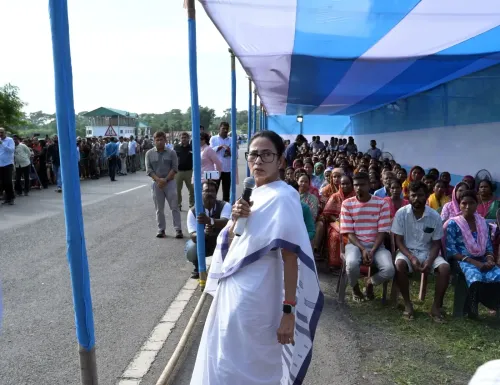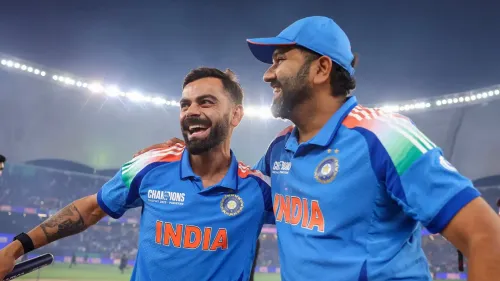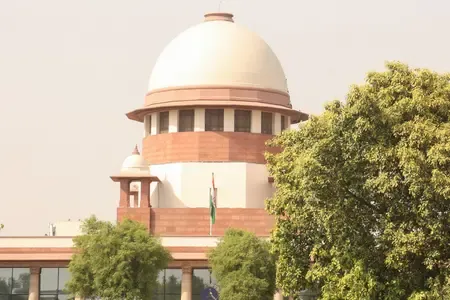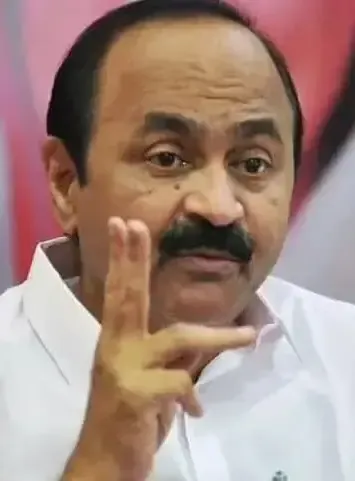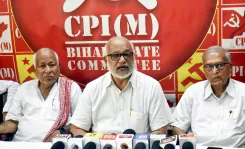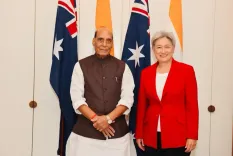What Key Talks Is Rajnath Singh Holding in Canberra?
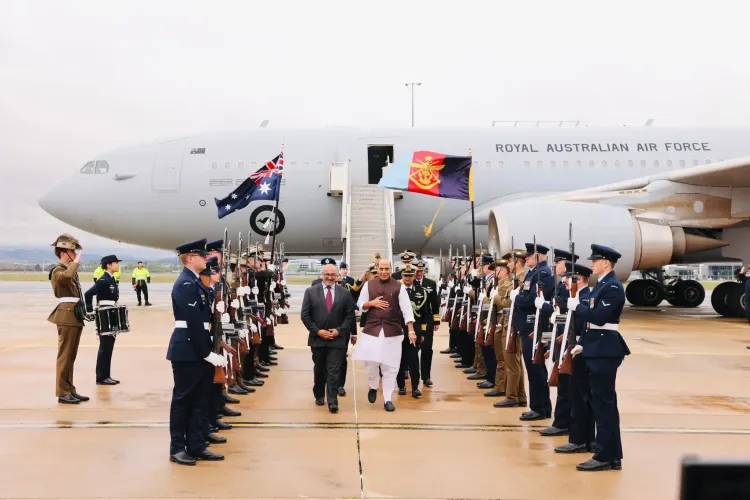
Synopsis
Key Takeaways
- Defence Minister Rajnath Singh is in Australia to enhance bilateral ties.
- Focus on strengthening maritime security in the Indo-Pacific.
- Three significant agreements are set to be signed.
- Partnership celebrates five years of the Comprehensive Strategic Partnership.
- Discussions include counter-terrorism cooperation.
Canberra, Oct 9 (NationPress) Defence Minister Rajnath Singh is poised to engage in vital discussions with Australia's Defence Minister Richard Marles and other prominent leaders in Canberra on Thursday. The aim is to bolster defence collaboration, enhance maritime security, and expand strategic partnerships in the Indo-Pacific region.
Singh touched down in Sydney on Wednesday, embarking on a two-day official visit to Australia at the invitation of Richard Marles, the country's Deputy Prime Minister and Defence Minister.
Upon his arrival in Canberra, Singh was warmly welcomed by Peter Khalil, Australia's Assistant Minister for Defence.
“Received a warm welcome from Mr. Peter Khalil, Assistant Minister for Defence of Australia, at the Royal Australian Air Force Base in Canberra. I eagerly anticipate our bilateral meeting with my esteemed colleague, Richard Marles, Deputy Prime Minister and Defence Minister of Australia,” Singh shared on X.
This visit is particularly significant as it coincides with the five-year anniversary of the Comprehensive Strategic Partnership (CSP) between India and Australia.
Moreover, it marks the first trip by an Indian Defence Minister to Australia under the leadership of Prime Minister Narendra Modi since 2014.
During his visit, Singh will engage in bilateral discussions with Marles and take part in a business roundtable in Sydney, focusing on collaboration opportunities in the defence and strategic sectors.
He is also scheduled to meet additional key national leaders in Australia.
Before his departure, Singh noted on X, “At the kind invitation of Deputy Prime Minister and Defence Minister Richard Marles, I am visiting Australia to continue our dialogue and exchange insights on mutual interests.”
“I look forward to meeting other national leaders of Australia and exploring cooperative initiatives between our countries. This visit is timely as we celebrate five years since the establishment of the Comprehensive Strategic Partnership. I am eager to deepen our ties further,” he added.
The Ministry of Defence emphasized that this visit presents a vital opportunity for both nations to identify new and meaningful initiatives aimed at strengthening their bilateral and defence relationships.
“During the visit, three agreements are expected to be signed, enhancing cooperation in information sharing, maritime domains, and joint activities,” the ministry stated.
Over the years, the India-Australia defence partnership has seen consistent growth, encompassing extensive engagements across all three military services, including joint exercises, capacity-building efforts, high-level visits, and ship exchanges.
This collaboration also includes military training programs and joint initiatives in maritime security and domain awareness.
The defence ministry highlighted that India and Australia elevated their relationship from a Strategic Partnership in 2009 to a Comprehensive Strategic Partnership in 2020. Both nations share a profound bond grounded in mutual values—pluralistic, Westminster-style democracies, Commonwealth traditions, and increasing high-level interactions.
“Long-standing people-to-people connections, the presence of Indian students in Australian universities, along with robust tourism and sports ties, have further solidified this enduring partnership,” it noted.
Earlier this year, in June, Richard Marles visited New Delhi, where he and Rajnath Singh held bilateral discussions. Both leaders condemned the terror attack in Pahalgam and conveyed their condolences to the victims' families.
Singh reaffirmed India's right to self-defense against cross-border terrorism, asserting that India's actions were “measured, non-escalatory, proportionate, and responsible.” Both parties agreed to continue their collaborative efforts to combat terrorism in all its forms.
Singh's visit is anticipated to further propel the growing strategic and defence cooperation between India and Australia, particularly in ensuring peace, stability, and a rules-based order in the Indo-Pacific region.

